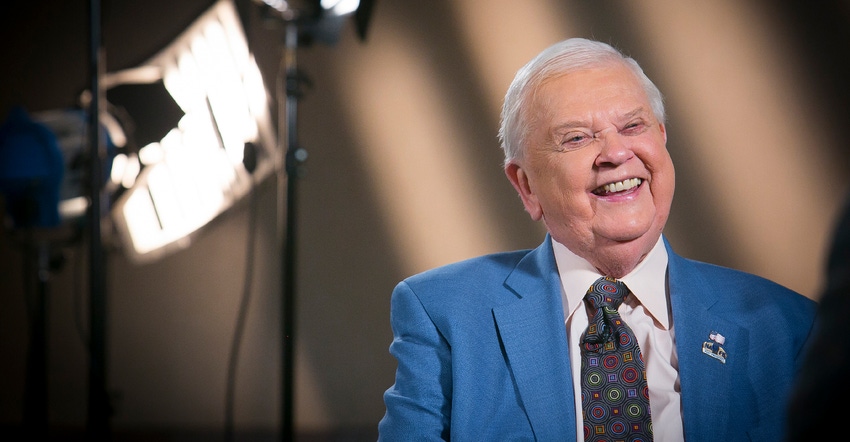
Orion Samuelson was just 27 years old when he made his way up North Michigan Avenue, striding toward the Tribune Tower. It was Sept. 26, 1960, and as he headed toward his first day on the job at WGN, a singular thought ran through his head.
“I couldn’t believe it was happening,” he says today.
At 86, his voice is as strong and deep and rich as it’s always been. But even 60 years later, you can hear awe in his familiar baritone.
“I walked into the studio and I thought, ‘I’m working with some big names at a big radio station — veterans — and they’re going to ignore me!’ But they did just the opposite,” he says, laughing.
“It was one of my biggest surprises.”
Related:
Orion Samuelson: Explaining agriculture to Chicago
How Orion became beloved in agriculture
What Orion means on the farm
Max on Orion: Champion for the American farmer
The Wisconsin farm boy got a lot of surprises in Chicago, including flattened tires for parking in the wrong spot and a missed market report or two, thanks to slow elevators in the Tribune Tower. But inside WGN, his new colleagues welcomed him into the family. One newscaster spent a week fathering Orion through three floors of studios, until he knew where to go and when to be there.
It was a good first day on the job. It would also be the last first day Orion Samuelson would ever have.
He’ll retire from WGN Radio at the end of this month, recording a landmark 60 years on WGN and creating original television programs such as “U.S. Farm Report” in 1975 and “This Week in AgriBusiness” in 2005. He’s originated broadcasts from all 50 states and 44 countries. But mainly, he’s told agriculture’s story from downtown Chicago, where he became a media icon and a beloved hall of fame broadcaster.
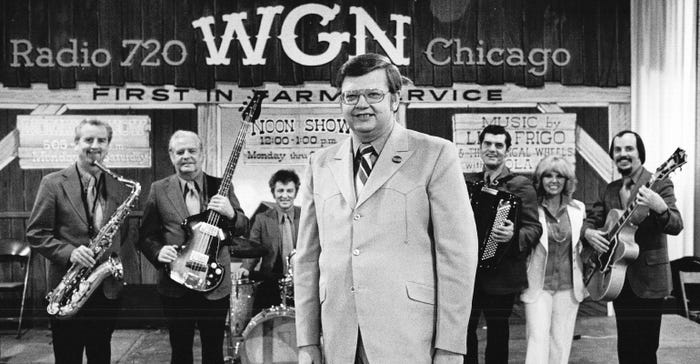
Orion is one of agriculture’s few celebrities, known to millions by his first name only, like Cher. Madonna. Garth. Not even Earl Butz had this kind of name recognition. For 60 years, Orion has commanded a room without even stepping into it. Indeed, entire generations have grown up on the farm conditioned to shush around the table or in the truck or across the milking parlor when Orion’s voice came on the radio. Reverence, always. And trust.
“He transcends generations,” says Cerro Gordo, Ill., farmer Jared Gregg. “I can recall the volume going up and our little voices being muted in my grandpa’s truck when Orion came on. He was cut from the same cloth as Paul Harvey. Reliable and true.”
And quotable. Monticello, Ind., farmer Brian Scott says his grandpa said the same thing after nearly every lunch: “Orion said …”
He was the voice on the radio but part of the farm family.
His own farm family
Orion’s stories of growing up on the family dairy in Ontario, Wis., are familiar to listeners: 30 milk cows, six sows, 200 chickens, 200 acres but only 90 tillable. “It wasn’t what you would call prime farmland,” he says.
His grandparents were Norwegian immigrants, and the first time Orion made his way to Norway, the spot his grandparents chose to homestead made more sense: steep hills with buildings carved into them. Ontario, Wis., looked like home.
Sid and Mona Samuelson made a good life for Orion and his younger sister, Norma. Young Orion was a tall kid headed for the basketball team the summer before high school when he was afflicted with a rare disease known as Legg-Perthes disease. The result: casts, wheelchairs and crutches. He wouldn’t walk again for two years. It was devastating.
Yet even tragedy has a silver lining, because what do you do when you’re confined to your bed in a Wisconsin farmhouse? You listen to the radio. And then you start dreaming.
Orion tuned in for Bert Wilson calling Cubs games, and he listened to the “National Barn Dance” every Saturday night on WLS — what was then the Prairie Farmer station — to hear stars like Gene Autry.
Around the same time, the vocational-agriculture teacher from school showed up on the Samuelsons’ doorstep, offering to bring Orion’s schoolwork out a couple of times a week and help him stay on pace with classmates. That teacher, Robert Gehring, went far out of his way to help a kid who really needed to catch a break. He went one further when he got Orion into public speaking contests. First, Orion won the section, and then he went to state, and then he placed second in all of Wisconsin. (And don’t you wonder about the kid who beat him?)
“I don’t know what happened to the guy who came in first,” Orion says, laughing. But he remembers the first time he spoke competitively: “My knees never stopped shaking!”
The big decisions
After high school, Orion headed to the University of Wisconsin on a scholarship, determined to learn how to be a radio announcer. He didn’t find what he as looking for there, though, and within a few weeks, he transferred to the American Institute of the Air in Minneapolis, a six-month program that promised a radio broadcasting certificate.
That was the ticket. Before the program was over, he’d scored a job at WKLJ in Sparta, Wis., less than 20 miles from the home farm. He drove home every weekend to be a polka music disc jockey. In 1954, he moved to WHBY in Appleton, Wis., to be the nighttime announcer, and by 1956, Orion had secured his first position as a farm broadcaster at WBAY in Green Bay, Wis.
At WBAY, he crossed paths with a fellow ag communicator named Jim Evans, who would go on to found the agricultural communications program at the University of Illinois. Later, Orion would earn an honorary doctor of letters from the U of I.
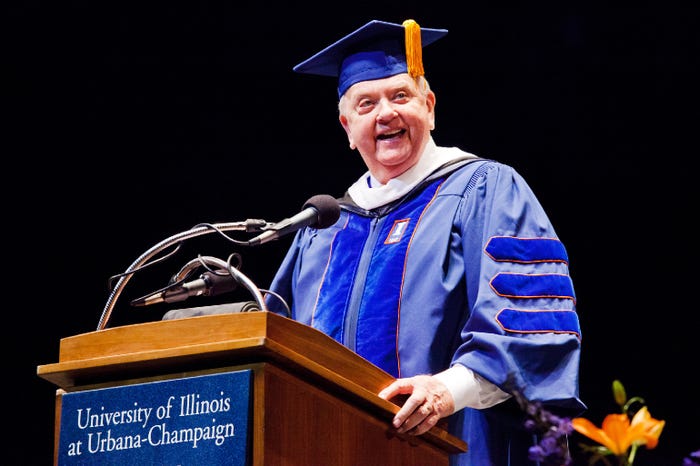
“Jim was very professional, and I learned several things from him that I still use,” Orion says. “‘If a story is worth doing, then check your facts and make sure you do it right,’ Jim would tell me.”
The feeling was mutual.
“Orion’s high standards of reporting, thought leadership, articulate expression and caring spirit continue to help energize and guide me in my professional interests, and in my life,” Evans says.
Chicago-bound
Throughout the 1930s, ’40s and ’50s, Prairie Farmer owned WLS, airing farm and rural programming such as the “National Barn Dance” and more. But times and tastes changed, and in early 1960, ABC bought WLS and converted it to a rock-and-roll station.
As that door closed in Chicago, another opened at WGN when the station picked up the farm programming torch — and Orion was invited to walk in.
“The manager at WBAY called me in and said, ‘I got a call from WGN, and they want to talk to you. I think you should do it,’” Orion recalls.
That mildly understated assessment launched the phenomenally successful WGN career that Orion is now retiring from, 60 years later.
Orion immediately set to work shaping WGN’s farm programming — after he aired up his tires and mastered the elevators, of course. Right away, he suggested bringing the “National Barn Dance” talent over to WGN, and in doing so, saved a few jobs and found himself working alongside the radio stars he listened to back on the dairy farm. This would turn out to be his trademark generosity, as he mentored dozens of young broadcasters and interns over the coming decades.
Becoming Orion
In those early years at WGN, on both radio and live television, Orion honed his craft and his on-air work, including his signature pronunciation of the word “ag-er-a-cul-ture,” with a few extra syllables. He listened to the veterans around him, picking out the good things they did that people liked.
“I don’t ever remember working on a style,” he says, “but I never took my voice for granted. Other people hear it differently than I do, thank God! I’m still amazed at how many people say, ‘I love that voice.’”
They also appreciate his interviews, likely because he’s a self-proclaimed “better listener than a speaker.”
It makes sense, he says. “You can’t respond to someone until you listen to them, and you can’t ask the right questions until you learn where they’re coming from.
“That’s a lesson we should all learn,” he adds quietly.
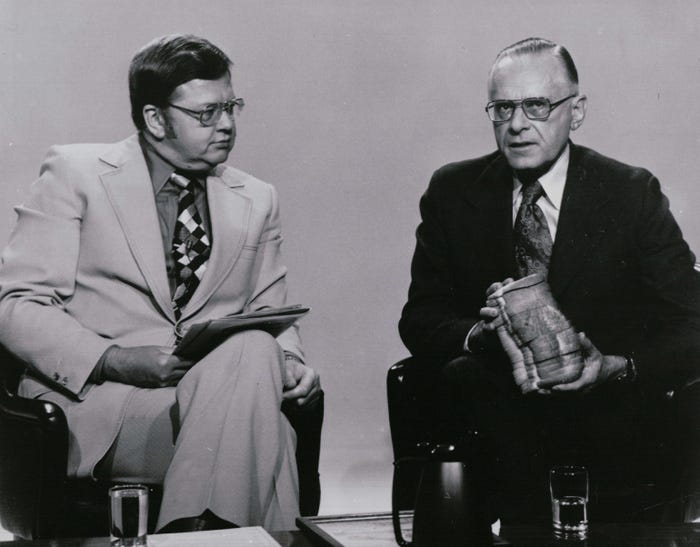
Orion got plenty of practice thinking on his feet, as WGN took the show on the road for 40 to 50 remote broadcasts a year — to county fairs, the Illinois State Fair, the Farm Progress Show and more. Over the years, Orion originated broadcasts all over the world, including 10 times in China and four in Russia. He spoke with the president of the United States just as easily as he spoke with a Chinese farmer in a rice paddy — or with the kid who’d just won champion steer at the state fair.
“If you eat, you’re involved in agriculture” is the line he’s used thousands of times at such events. And yes, those programs often started and ended with an Ole and Lena joke. He served as master of ceremonies for thousands of shows and crowned dozens of queens, using his own plane to travel efficiently. Like regular Orion, “Air Orion” will retire soon, too.
And then there was Max
Few partnerships in agriculture are as easily recognized as that of Max and Orion — again, by first names only. Max Armstrong joined Orion at WGN in 1977, and as they spent the next 43 years together on air, they developed a seamless rapport.
“I think what’s worked so well for us is that we’re different enough to really complement each other,” Max says. “We operate in different ways. I love being in the countryside and on farms. Orion’s realm is in the city with the movers and shakers.”
Max and Orion spent 31 years together on WGN, until Max left in 2009 to join Farm Progress. They still do a one-hour radio show together every Saturday at 5 a.m., and they partner on “This Week in AgriBusiness,” airing on television stations nationwide and on RFD-TV.
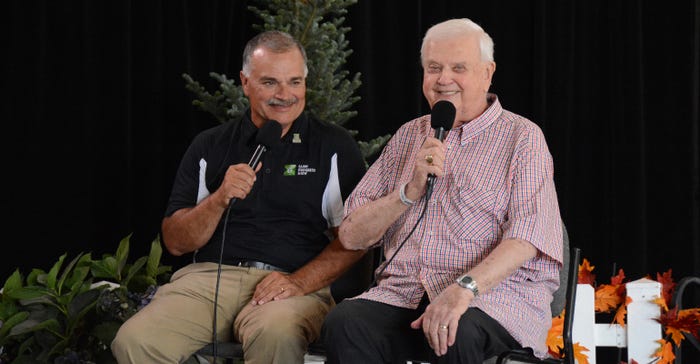
No one’s shared more airtime with Orion than Max, and he’s the first to admit he got a lot of spillover from Orion’s popularity. “When I started, Orion was so highly regarded by everyone at WGN. Everyone loved him — the engineers and everyone behind the scenes,” he describes.
Why? Simple country hospitality has always gone a long way, Max says. If someone brought Orion fresh sweet corn or asparagus, he shared it with the engineers. When they went on remote broadcasts, he included them in dinners.
As for why his listeners love him so, Max has a few ideas: Orion is reliable, credible and accurate. And so even-tempered. “Don’t make a mountain out of this — let’s wait and see what we’ve got” was his approach to crises large and small.
And he championed the farmer’s cause. It’s not for nothing that Orion is known as “The Voice of Agriculture.” Together, these two farm boys sat down every day in a studio in Chicago and talked about agriculture with a 50,000-watt transmitter and hundreds of networked stations, explaining pork bellies and beef demand to suburban housewives. Radio greats like Paul Harvey called on them to explain issues and provide a counterpoint when the latest anti-ag book came out.
Nearly a newsmaker?
And while Orion has covered 19 different secretaries of agriculture and eight presidents, and even dined at the White House, he nearly became a candidate himself — for about four days back in 2007. The Republicans were looking for someone to run against Democratic Senate candidate Barack Obama. Orion spent one Sunday at then-Rep. Denny Hastert’s house, running through the possibilities.
“So, it’s one of those ‘what might have been’ stories — but I value my relationship with my wife,” Orion says, laughing. Gloria took the sensible route, thinking it too taxing to campaign following a recent throat surgery.
He was also on President Ronald Reagan’s short list for secretary of agriculture, which ultimately ended in John Block’s selection. “He was much better than I would have been,” Orion reassures.
These days, Orion is dialing back obligations and busy recovering from back surgery. He will retire from WGN’s airwaves on Dec. 31. He hopes to give the Illinois State Fair Sale of Champions another go in 2021 — working hard to create some magic in the Coliseum for young livestock exhibitors.
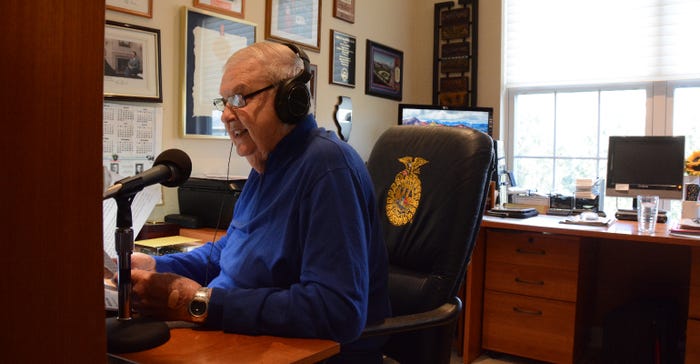
Like the farmers he’s served all these years, Orion celebrated that last first day on the job long ago. And that’s OK. In fact, it might be what they like about him best.
Steady. Consistent. Trustworthy.
And always, loyal to the farmer.
Leading lady
Gloria Samuelson may get the biggest credit of all: saving Orion’s life.
The pair were married in 2001. She spotted early signs of a serious illness one day in 2004, during a television broadcast.
“I tend to wait until tomorrow, but she said, ‘Look at this now, because we don’t wait,’” Orion recalls. It turns out he had a flesh-eating bacteria working on his throat. Her quick thinking and determination got him into surgery and saved his life — and his voice.
Orion and his first wife adopted two children, David and Katheryn. David is retired from a career as a trader on the Chicago Board of Trade and has two children of his own, and Katheryn is in the restaurant business. Orion’s first marriage ended in divorce, and his second wife died of Lou Gehrig’s disease.
Orion says he tried to pass along two pieces of advice to his children: Always be honest in what you do, and speak your thoughts, but don’t let politics or religion destroy relationships.
Gloria says those are among the traits that have made him successful — that and being generous with his time and talents, especially with young people.
The feeling is mutual. “She’s a beautiful lady and a beautiful partner,” he says.
Read more:
Orion Samuelson: Explaining agriculture to Chicago
How Orion became beloved in agriculture
What Orion means on the farm
Max on Orion: Champion for the American farmer
About the Author(s)
You May Also Like






